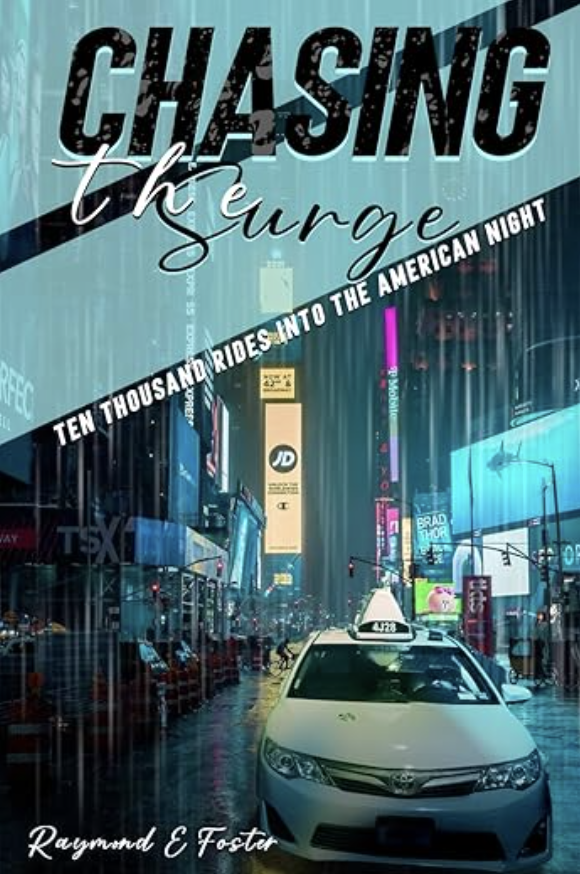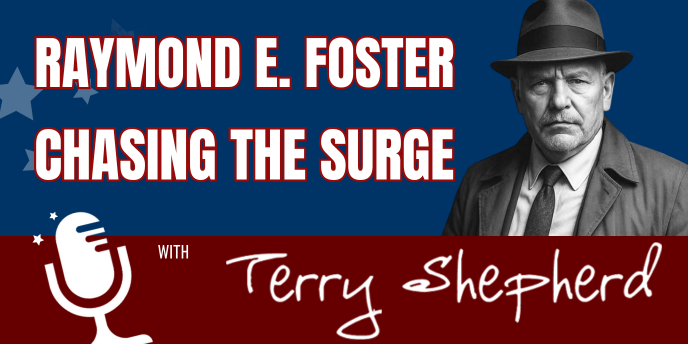Hear the Conversation | Get the Book

Within the nocturnal symphony of a Los Angeles night, a nondescript sedan drifts quietly through the sprawl. Behind the wheel is Raymond E. Foster, a man who has lived more than one life: former lieutenant of the LAPD, Coast Guard veteran, police scholar, Mason. Now, he is something else entirely, a driver for hire, ferrying strangers through the city’s sleepless arteries. His new book, Chasing the Surge: Ten Thousand Rides into the American Night, chronicles this unlikely second act. It is part social document, part noir confession, and part act of self-reinvention.
For Raymond, the transition from policing to rideshare wasn’t a fall from grace but a continuation of curiosity. “The first thing a good cop learns,” he says, “is what normal looks like.” Body language, tone and timing tell the story. Behind the wheel of an Uber, those same instincts became tools for narrative rather than enforcement. He didn’t ask questions; he listened. He found that silence, the simple suspension of authority, drew people out. “If you just shut up,” he reflects, “people are gonna tell on themselves.” It’s the kind of lesson one learns both in interrogation rooms and on the midnight shift, human nature, rendered in long form.
The book that emerged from those nights began as an exercise in craft. Raymond, already the author of several textbooks on policing and technology, wanted to learn fiction from the ground up. A thousand rides, he told himself, would be his apprenticeship. He took ten thousand. He cataloged them with a detective’s precision before distilling them into prose lean enough to cut glass. The early drafts, he admits, were “garbage,” the detritus of a man too close to his material. The revelation came when he stopped trying to write about his passengers and began writing about himself. The story, he realized, wasn’t what happened in the backseat, it was the man watching from the rearview mirror. “I’m the one that changes,” he says.
The resulting book reads like Raymond Chandler reimagined for the gig economy: sharp, economical, absurdly human. In one vignette, Raymond picks up two people in full-body cat costumes. The car fills with what he calls “the faint scent of vanilla or maybe bubblegum.” They sit in silence until one cat accuses the other of infidelity: “I saw you with that squirrel.” What follows is an absurd, strangely moving conversation about loyalty in plush fur. It is a snapshot of the surreal intimacy that occurs when lives briefly intersect under flickering streetlights.
Yet for all its noir sensibility, the book refuses cynicism. After decades spent navigating humanity’s worst impulses, Raymond has found something like grace in its ordinary chaos. “I have great faith in humanity,” he says. Each broken story, each late-night confession, affirms that the world still works. Streetlights still come on. People still get where they’re going. “We’re in a transformation,” he tells me, “the same way we were in the seventies. It’s messy, but we’ll get through it.” By day, Raymond lectures on leadership and writes about Freemasonry. His other recent book, The Temple Within, is a 455-page meditation on symbols, ritual, and self-mastery. The duality doesn’t trouble him. “A police officer is a consummate actor,” he says. “We all play so many parts.” Chasing the Surge is an account of one man’s chronicle of reinvention in a culture addicted to motion. In the backseat of his unremarkable sedan, amid laughter, tears, and the occasional costumed argument, Raymond Foster rediscovers the oldest lesson of all: that beneath the noise and anonymity of the modern city, the human story persists.

